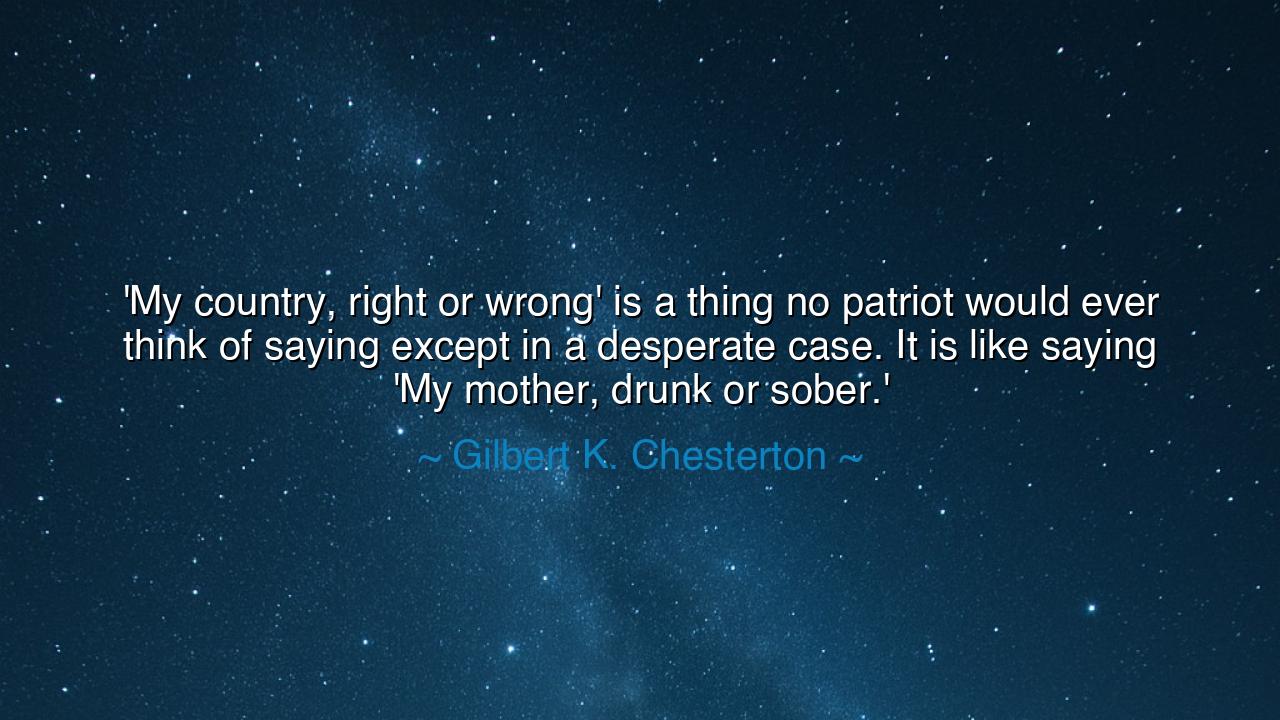
'My country, right or wrong' is a thing no patriot would ever
'My country, right or wrong' is a thing no patriot would ever think of saying except in a desperate case. It is like saying 'My mother, drunk or sober.'






Hearken, children of the future, and attend to the piercing wisdom of Gilbert K. Chesterton, who proclaimed, “'My country, right or wrong' is a thing no patriot would ever think of saying except in a desperate case. It is like saying 'My mother, drunk or sober.'” In this vivid analogy lies a profound truth: true patriotism is not blind obedience or unquestioning loyalty, but a thoughtful devotion that recognizes the strengths and flaws of one’s homeland. Love of country, like love of family, demands discernment, moral courage, and a refusal to excuse wrongdoing simply because it emanates from one’s own soil.
The origin of this reflection emerges from Chesterton’s acute observation of human society and politics in the early twentieth century, a period marked by national fervor, conflict, and moral ambiguity. He saw too many voices exalt their nation as inherently righteous, excusing injustice, cruelty, or corruption under the guise of patriotic loyalty. In comparing this to loving one’s mother, whether in virtue or in fault, Chesterton illuminates the delicate balance between affection and ethical judgment, teaching that true loyalty does not demand compromise of conscience.
Consider the historical example of Abraham Lincoln, who loved his country deeply, yet did not shy away from acknowledging its failings. He confronted the moral abomination of slavery, understanding that devotion to the nation required action, not passive approval of injustice. Lincoln’s patriotism was active, courageous, and principled, demonstrating that true loyalty must be guided by moral discernment rather than blind allegiance—a living embodiment of Chesterton’s insight.
Chesterton’s words also illuminate the danger of unquestioning allegiance. To utter, “My country, right or wrong,” is to suspend judgment, to abdicate conscience, and to elevate loyalty above virtue. Such devotion, he warns, is desperate, born of fear, inertia, or unreflective habit, and risks corruption of both character and society. True patriotism honors the nation not as infallible, but as a sacred trust that must be preserved, improved, and guided by moral principle.
In modern reflection, this insight resonates in political discourse, civic engagement, and the duties of citizenship. Blind allegiance can enable injustice, corruption, and oppression, while informed and critical devotion strengthens democratic institutions, safeguards the rights of the vulnerable, and upholds the integrity of the nation. Chesterton teaches that love of country flourishes not through passive admiration, but through active vigilance, ethical reflection, and the courage to challenge wrongdoing when necessary.
From this reflection flows a practical lesson: cultivate a patriotism rooted in principles, not mere sentiment. Love your country, but recognize its flaws; honor its achievements, but confront its injustices. Engage actively in civic life, question leaders when necessary, and act to strengthen the moral and social foundations of society. Loyalty untempered by conscience is hollow; devotion guided by virtue becomes enduring.
Moreover, teach this principle to others, fostering a culture where patriotism is both reflective and courageous. Encourage dialogue, critical thinking, and moral courage, demonstrating that national loyalty does not demand the sacrifice of conscience. In doing so, the love of the homeland becomes a force for justice, unity, and the elevation of shared values.
Thus, children of tomorrow, inscribe upon your hearts this eternal truth: to say “My country, right or wrong” is a sign of despair, not devotion. True patriotism demands thought, courage, and ethical discernment, much like the love of one’s family. Let your allegiance be principled, your loyalty moral, and your service to the nation guided by conscience and justice. In this way, Chesterton teaches, the highest form of patriotism honors both the country and the eternal virtues that sustain it.






AAdministratorAdministrator
Welcome, honored guests. Please leave a comment, we will respond soon